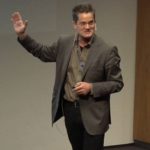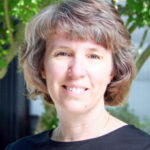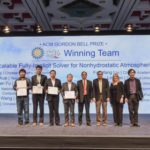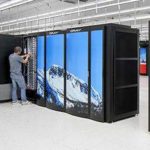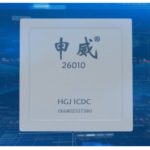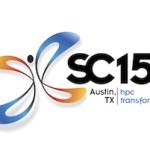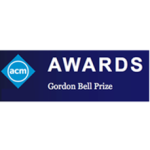Thomas Schulthess from CSCS gave this Invited Talk at SC16. “Experience with today’s platforms show that there can be an order of magnitude difference in performance within a given class of numerical methods – depending only on choice of architecture and implementation. This bears the questions on what our baseline is, over which the performance improvements of Exascale systems will be measured. Furthermore, how close will these Exascale systems bring us to deliver on application goals, such as kilometer scale global climate simulations or high-throughput quantum simulations for materials design? We will discuss specific examples from meteorology and materials science.”
Podcast: LLNL’s Lori Diachin Reviews the SC16 Technical Program
“I think the most important thing I’d like people to know about SC16 is that it is a great venue for bringing the entire community together, having these conversations about what we’re doing now, what the environment looks like now and what it’ll look like in five, ten fifteen years. The fact that so many people come to this conference allows you to really see a lot of diversity in the technologies being pursued, in the kinds of applications that are being pursued – from both the U.S. environment and also the international environment. I think that’s the most exciting thing that I think about when I think about supercomputing.”
Full Rundown of SC16 Stats, World Records, and Awards
The numbers are in for SC16, the international supercomputing conference that wrapped up last week in Salt Lake City. The conference drew more than 11,100 registered attendees and featured a technical program spanning six days. “The SC16 Exhibition was the largest in the history of the conference, with 349 exhibitors from industry, academia and research organizations from around the world.”
Chinese Research Team Wins Gordon Bell Prize using #1 Sunway TaihuLight Supercomputer
A weather science team from China has won 2016 ACM Gordon Bell Prize for their research project, “10M-Core Scalable Fully-Implicit Solver for Nonhydrostatic Atmospheric Dynamics.” The winning team presented a method for calculating atmospheric dynamics on the world’s fastest computer, the 93 Petaflop Sunway TaihuLight system. “On the road to the seamless weather-climate prediction, a major obstacle is the difficulty of dealing with various spatial and temporal scales. The atmosphere contains time-dependent multi-scale dynamics that support a variety of wave motions.”
Powering Aircraft CFD with the Piz Daint Supercomputer
The Piz Daint supercomputer at the Swiss National Supercomputing Centre (CSCS) is again assisting researchers in competition for the prestigious Gordon Bell prize. “Researchers led by Peter Vincent from Imperial College London have made this year’s list of finalists for the Gordon Bell prize, with the backing of Piz Daint at the Swiss National Supercomputing Centre. The prize is awarded annually in November at SC, the world’s largest conference on supercomputing. It honors the success of scientists who are able to achieve very high efficiencies for their research codes running on the fastest supercomputer architectures currently available.”
Finalists Announced for Gordon Bell Prize in HPC
“High performance computing continues to underwrite the progress of research using computational methods for the analysis and modeling of complex phenomena,” said Vint Cerf and John White, ACM Award Committee co-chairs, in a statement. “This year’s finalists illustrate the key role that high performance computing plays in 21st Century research. The Gordon Bell Award committee has worked diligently to select from many choices, those most deserving of recognition for this year. Like everyone else, we will be eager to learn which of the nominees takes the top prize for 2016.”
China Leads TOP500 with Home-grown Technology
In this special guest feature, Robert Roe from Scientific Computing World writes that the new #1 system on the TOP500 is using home-grown processors to shake up the supercomputer industry. “While the system does have a focus towards computation, as opposed to the more data-centric computing strategies that we have begun to see implemented in the US and Europe, it is most certainly not just a Linpack supercomputer. The report explains that there are already three applications running on the Sunway TaihuLight system which are finalists for the Gordon Bell Award at SC16.”
SC15 Announces Attendance Record & Awards Roundup
SC15 has released results from the Supercomputing conference in Austin. This year, the conference drew a record 12,868 attendees, including 4,829 who registered for the six-day Technical Program of invited speakers, technical papers, research posters, tutorials, workshops and more.
Podcast: Supercomputing the Deep Earth with the Gordon Bell Prize Winners
In this podcast, Jorge Salazar from TACC interviews two winners of the 2015 ACM Gordon Bell Prize, Omar Ghattas and Johann Rudi of the Institute for Computational Engineering and Sciences, UT Austin. As part of the discussion, Ghattas describes how parallelism and exascale computing will propel science forward.
SC15 Announces Finalists for Gordon Bell Prize
SC15 just announced the finalists for the the ACM Gordon Bell Prize in High Performance Computing. The $10,000 prize will be presented to the winner at the conference, which takes place Nov. 15-20 in Austin.

